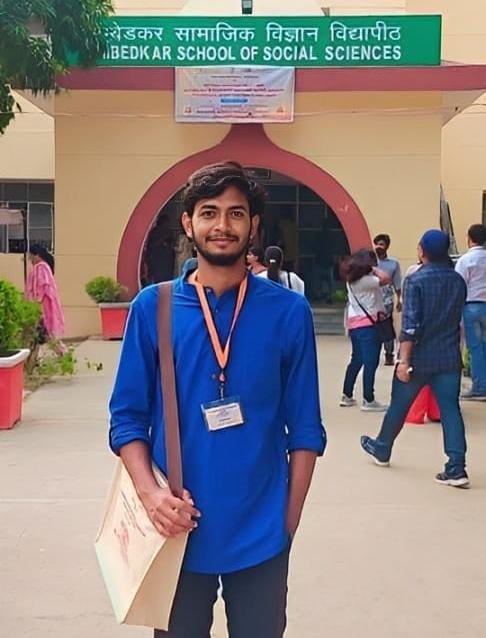Recently, Team Jansamwaad interviewed Samin Maltiya, who hails from Murshidabad, West Bengal. Samin is a first-generation learner and completed his Master’s in Sociology from Babasaheb Bhimrao Ambedkar University, Lucknow. He is also a member of the student organization All India Democratic Students’ Organisation (AIDSO). Samin aspires to research the divide between urban and rural students and how rural students feel isolated in elite urban spaces.
How do you feel being a Muslim in this country?
On this question, Samin tells us that when he was living in Murshidabad, he didn’t pay much attention to his Muslim identity because he was surrounded by Muslim families. But when he moved to different places, including Kolkata, his Muslim identity became a huge problem. He was several times questioned about his religiosity and sometimes even asked, “Are you a Muslim or Bengali?” The fact is that Bengali is a linguistic identity, not a religious identity, but only Hindus, mostly from upper castes, are considered Bengali. Samin also narrated that in his college days, he often faced wrath from his professors for being Muslim, and sometimes professors openly had anti-Muslim conversations. Samin tells us that Muslims, especially from rural and backward backgrounds, do have an isolated feeling in elite urban spaces.
What’s your take on the zero representation of Muslims in Modi 3.0 cabinet?
Samin feels that merely giving one or two posts to Muslims will not bring equality. Still, there should be representation of the Muslim community in the Council of Ministers. It shows that one community is ignored by the current political regime.
What do you think about the current reservation system in the country?
Samin says that even the current reservation system cannot bring complete social justice to the people. But whatever existing reservation system we have, we need proper implementation of it so that highly underrepresented communities like SC/ST/OBCs get their due share.
This Lok Sabha Election reservation for Muslims was hugely debated. Do you think Muslims should get reservation on a religious or backwardness basis?
Samin says the constitution of this country advocates reservation on the basis of social-educational backwardness, and Muslims are getting reservation on that basis. In the future also, Muslims should also get reservation on social-educational backwardness, not on a religious basis.
Recently, the Calcutta High Court scrapped all the OBC certificates in West Bengal. Is this right?
Samin says, “I was also part of the OBC state list, but I feel that the court made the right decision because there were many discrepancies in OBC reservation in the state. There was no proper survey done before implementing reservation in the state. So, the state government must adhere to the orders of the High Court, and after conducting a survey, there should be an allocation of OBC certificates in the state.”
What’s your take on B.R. Ambedkar?
Samin tells us, “I belong to the West Bengal region of this country, where Raja Ram Mohan Roy, Subhash Chandra Bose, and Ishwar Chandra Vidyasagar are taught in schools and colleges. I initially knew Ambedkar just as a constitution maker. In the real sense, I got to know about Ambedkar in university, where I started reading books on him and was influenced by his ideas about a classless society. I am still in the process of understanding Ambedkar and his ideas about Marxist philosophy.”
Being in an Ambedkarite campus, why did you not join an Ambedkarite students association and stick to left politics?
Samin tells us that Ambedkar has had a great impact on his life, and he is still in the process of reading Ambedkar thoroughly. He feels that there are various grounds for discrimination in the country, and along with caste, class, religion, and language also create grounds for discrimination. Currently, Ambedkarite groups feel that Ambedkar is a leader of Dalits only, but Ambedkar is not just limited to Dalits; he is a leader for all. He feels that Ambedkarite groups on his campus have exclusionary policies, and he did not fit with them. We need more inclusive policies, so he remains with his AIDSO organization, focusing on struggle, unity, and progress, and he will achieve his aim of secularizing educational spaces through this organization.
Caste is a crucial issue in this country. Do you think Muslims have a caste?
Samin agrees that caste and casteism are crucial issues in this country, casteism and capitalism are inter-related, the upper castes of this country advocated casteism through their feaudalism and in modern era, through capitalism. This feudal mindset can be seen in ‘Ashrafs’ of India, Although Islamic scriptures do not talk about varna and jati, but, being part of the Indian subcontinent, caste has permeated Indian Islam as well, and Indian Islam does have a caste system, with people being discriminated against on that basis.
What would be your message to the downtrodden sections of India?
Samin says that he likes B.R. Ambedkar’s idea of “Unite and Educate.” Additionally, he would like to add that the downtrodden of this country must know about their enemies. Identifying their real enemies will bring more social and economic change in this country.
-Views expressed by Samin Maltiya is personal.


